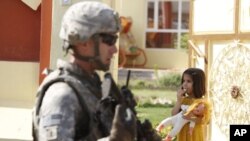U.S. forces are on track to pull out of Iraq at the end of the year. The number of American troop casualties dropped to zero last month, for the first time since the U.S.-led invasion in 2003. But there remain questions of how stable Iraq will be after the withdrawal of United States forces.
August was the least deadly month for U.S. forces in Iraq in eight years. For the Pentagon, that is an indication that the country is a safer place than it was before. For Iraqis, a spate of bombings in recent weeks has kept up fears that the violence is not going away.
Forty-seven-thousand troops still in Iraq are due to leave by December 31 under a 2008 agreement between the United States and the Iraqi government.
U.S. military officials have been focusing on training Iraqi forces and they say all is on track for the departure of U.S. troops this year. A U.S. Army commander in Iraq, Colonel Brian Winski, says his soldiers in northern Iraq's Nineveh Province are preparing the Iraqis to train their own troops. “If everything proceeds as planned and the U.S. forces are out of the province in the not too distant future, I am confident the Iraqi forces there will be fine," he said.
While August was a good month for U.S. forces, for Iraqis, the past few weeks brought a spike in sectarian violence - including the bombing of a Sunni mosque in Baghdad during Ramadan that killed 29 people. Iraqi officials say 155 people were killed in attacks in August.
The U.S. accuses Iran of supporting Shi'ite Muslim groups, and there are concerns that Tehran might step up its activities in Iraq after the departure of U.S. forces. At the same time, Sunni insurgents continue their attacks on Iraqi security forces and civilians.
John Pike is director of Globalsecurity.org, a military information website. He says there is still much potential for an escalation of sectarian violence. “It’s a new democracy and it’s going to take them some time to figure out how to run it. Unfortunately, the factions there are very evenly divided with no evident upper hand in play, and it’s unavoidably going to be difficult for them for a number of different reasons, not least of which is that all the factions are appealing to outside powers, appealing to Iran, appealing to the United States," he said.
Some Iraqis say they felt safer during Saddam Hussein’s time, when the dictator focused on attacking his opponents and ordinary people did not fear getting caught in random sectarian fighting.
Michael O’Hanlon is a defense analyst at the Brookings Institution research group. He says the violence today, while troubling, still represents a remarkable improvement from four years ago, at the height of the conflict. He says that with Saddam Hussein out and a degree of stability restored to Iraq, where things go now depends on the Iraqis.
“Even though it’s too soon to say whether the overall decision to overthrow Saddam was worth it, I think we can judge the military mission to have been an eventual success at this point. What I mean by that is if Iraq fails at this point, it won’t be because of the failure of the American military, or the international coalition. They’ve done all they can," he said.
The United States is prepared for a full withdrawal by December 31, but says it may extend the presence of at least some troops - if Iraqi leaders request it.
US Casualties in Iraq Drop, But Iraqis Concerned About Withdrawal
- By Luis Ramirez

